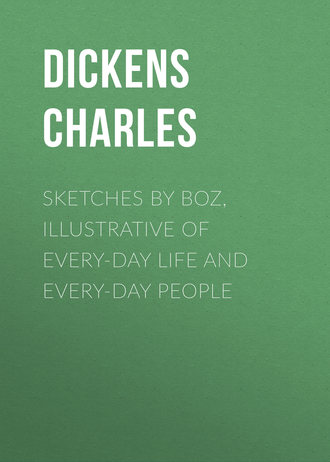
Чарльз Диккенс
Sketches by Boz, Illustrative of Every-Day Life and Every-Day People
The man hammered away at the drum, the flageolet squeaked, the shovels rattled, the ‘green’ rolled about, pitching first on one side and then on the other; my lady threw her right foot over her left ankle, and her left foot over her right ankle, alternately; my lord ran a few paces forward, and butted at the ‘green,’ and then a few paces backward upon the toes of the crowd, and then went to the right, and then to the left, and then dodged my lady round the ‘green;’ and finally drew her arm through his, and called upon the boys to shout, which they did lustily – for this was the dancing.
We passed the same group, accidentally, in the evening. We never saw a ‘green’ so drunk, a lord so quarrelsome (no: not even in the house of peers after dinner), a pair of clowns so melancholy, a lady so muddy, or a party so miserable.
How has May-day decayed!
CHAPTER XXI – BROKERS’ AND MARINE-STORE SHOPS
When we affirm that brokers’ shops are strange places, and that if an authentic history of their contents could be procured, it would furnish many a page of amusement, and many a melancholy tale, it is necessary to explain the class of shops to which we allude. Perhaps when we make use of the term ‘Brokers’ Shop,’ the minds of our readers will at once picture large, handsome warehouses, exhibiting a long perspective of French-polished dining-tables, rosewood chiffoniers, and mahogany wash-hand-stands, with an occasional vista of a four-post bedstead and hangings, and an appropriate foreground of dining-room chairs. Perhaps they will imagine that we mean an humble class of second-hand furniture repositories. Their imagination will then naturally lead them to that street at the back of Long-acre, which is composed almost entirely of brokers’ shops; where you walk through groves of deceitful, showy-looking furniture, and where the prospect is occasionally enlivened by a bright red, blue, and yellow hearth-rug, embellished with the pleasing device of a mail-coach at full speed, or a strange animal, supposed to have been originally intended for a dog, with a mass of worsted-work in his mouth, which conjecture has likened to a basket of flowers.
This, by-the-bye, is a tempting article to young wives in the humbler ranks of life, who have a first-floor front to furnish – they are lost in admiration, and hardly know which to admire most. The dog is very beautiful, but they have a dog already on the best tea-tray, and two more on the mantel-piece. Then, there is something so genteel about that mail-coach; and the passengers outside (who are all hat) give it such an air of reality!
The goods here are adapted to the taste, or rather to the means, of cheap purchasers. There are some of the most beautiful looking Pembroke tables that were ever beheld: the wood as green as the trees in the Park, and the leaves almost as certain to fall off in the course of a year. There is also a most extensive assortment of tent and turn-up bedsteads, made of stained wood, and innumerable specimens of that base imposition on society – a sofa bedstead.
A turn-up bedstead is a blunt, honest piece of furniture; it may be slightly disguised with a sham drawer; and sometimes a mad attempt is even made to pass it off for a book-case; ornament it as you will, however, the turn-up bedstead seems to defy disguise, and to insist on having it distinctly understood that he is a turn-up bedstead, and nothing else – that he is indispensably necessary, and that being so useful, he disdains to be ornamental.
How different is the demeanour of a sofa bedstead! Ashamed of its real use, it strives to appear an article of luxury and gentility – an attempt in which it miserably fails. It has neither the respectability of a sofa, nor the virtues of a bed; every man who keeps a sofa bedstead in his house, becomes a party to a wilful and designing fraud – we question whether you could insult him more, than by insinuating that you entertain the least suspicion of its real use.
To return from this digression, we beg to say, that neither of these classes of brokers’ shops, forms the subject of this sketch. The shops to which we advert, are immeasurably inferior to those on whose outward appearance we have slightly touched. Our readers must often have observed in some by-street, in a poor neighbourhood, a small dirty shop, exposing for sale the most extraordinary and confused jumble of old, worn-out, wretched articles, that can well be imagined. Our wonder at their ever having been bought, is only to be equalled by our astonishment at the idea of their ever being sold again. On a board, at the side of the door, are placed about twenty books – all odd volumes; and as many wine-glasses – all different patterns; several locks, an old earthenware pan, full of rusty keys; two or three gaudy chimney-ornaments – cracked, of course; the remains of a lustre, without any drops; a round frame like a capital O, which has once held a mirror; a flute, complete with the exception of the middle joint; a pair of curling-irons; and a tinder-box. In front of the shop-window, are ranged some half-dozen high-backed chairs, with spinal complaints and wasted legs; a corner cupboard; two or three very dark mahogany tables with flaps like mathematical problems; some pickle-jars, some surgeons’ ditto, with gilt labels and without stoppers; an unframed portrait of some lady who flourished about the beginning of the thirteenth century, by an artist who never flourished at all; an incalculable host of miscellanies of every description, including bottles and cabinets, rags and bones, fenders and street-door knockers, fire-irons, wearing apparel and bedding, a hall-lamp, and a room-door. Imagine, in addition to this incongruous mass, a black doll in a white frock, with two faces – one looking up the street, and the other looking down, swinging over the door; a board with the squeezed-up inscription ‘Dealer in marine stores,’ in lanky white letters, whose height is strangely out of proportion to their width; and you have before you precisely the kind of shop to which we wish to direct your attention.
Although the same heterogeneous mixture of things will be found at all these places, it is curious to observe how truly and accurately some of the minor articles which are exposed for sale – articles of wearing apparel, for instance – mark the character of the neighbourhood. Take Drury-Lane and Covent-garden for example.
This is essentially a theatrical neighbourhood. There is not a potboy in the vicinity who is not, to a greater or less extent, a dramatic character. The errand-boys and chandler’s-shop-keepers’ sons, are all stage-struck: they ‘gets up’ plays in back kitchens hired for the purpose, and will stand before a shop-window for hours, contemplating a great staring portrait of Mr. Somebody or other, of the Royal Coburg Theatre, ‘as he appeared in the character of Tongo the Denounced.’ The consequence is, that there is not a marine-store shop in the neighbourhood, which does not exhibit for sale some faded articles of dramatic finery, such as three or four pairs of soiled buff boots with turn-over red tops, heretofore worn by a ‘fourth robber,’ or ‘fifth mob;’ a pair of rusty broadswords, a few gauntlets, and certain resplendent ornaments, which, if they were yellow instead of white, might be taken for insurance plates of the Sun Fire-office. There are several of these shops in the narrow streets and dirty courts, of which there are so many near the national theatres, and they all have tempting goods of this description, with the addition, perhaps, of a lady’s pink dress covered with spangles; white wreaths, stage shoes, and a tiara like a tin lamp reflector. They have been purchased of some wretched supernumeraries, or sixth-rate actors, and are now offered for the benefit of the rising generation, who, on condition of making certain weekly payments, amounting in the whole to about ten times their value, may avail themselves of such desirable bargains.
Let us take a very different quarter, and apply it to the same test. Look at a marine-store dealer’s, in that reservoir of dirt, drunkenness, and drabs: thieves, oysters, baked potatoes, and pickled salmon – Ratcliff-highway. Here, the wearing apparel is all nautical. Rough blue jackets, with mother-of-pearl buttons, oil-skin hats, coarse checked shirts, and large canvas trousers that look as if they were made for a pair of bodies instead of a pair of legs, are the staple commodities. Then, there are large bunches of cotton pocket-handkerchiefs, in colour and pattern unlike any one ever saw before, with the exception of those on the backs of the three young ladies without bonnets who passed just now. The furniture is much the same as elsewhere, with the addition of one or two models of ships, and some old prints of naval engagements in still older frames. In the window, are a few compasses, a small tray containing silver watches in clumsy thick cases; and tobacco-boxes, the lid of each ornamented with a ship, or an anchor, or some such trophy. A sailor generally pawns or sells all he has before he has been long ashore, and if he does not, some favoured companion kindly saves him the trouble. In either case, it is an even chance that he afterwards unconsciously repurchases the same things at a higher price than he gave for them at first.
Again: pay a visit with a similar object, to a part of London, as unlike both of these as they are to each other. Cross over to the Surrey side, and look at such shops of this description as are to be found near the King’s Bench prison, and in ‘the Rules.’ How different, and how strikingly illustrative of the decay of some of the unfortunate residents in this part of the metropolis! Imprisonment and neglect have done their work. There is contamination in the profligate denizens of a debtor’s prison; old friends have fallen off; the recollection of former prosperity has passed away; and with it all thoughts for the past, all care for the future. First, watches and rings, then cloaks, coats, and all the more expensive articles of dress, have found their way to the pawnbroker’s. That miserable resource has failed at last, and the sale of some trifling article at one of these shops, has been the only mode left of raising a shilling or two, to meet the urgent demands of the moment. Dressing-cases and writing-desks, too old to pawn but too good to keep; guns, fishing-rods, musical instruments, all in the same condition; have first been sold, and the sacrifice has been but slightly felt. But hunger must be allayed, and what has already become a habit, is easily resorted to, when an emergency arises. Light articles of clothing, first of the ruined man, then of his wife, at last of their children, even of the youngest, have been parted with, piecemeal. There they are, thrown carelessly together until a purchaser presents himself, old, and patched and repaired, it is true; but the make and materials tell of better days; and the older they are, the greater the misery and destitution of those whom they once adorned.
CHAPTER XXII – GIN-SHOPS
It is a remarkable circumstance, that different trades appear to partake of the disease to which elephants and dogs are especially liable, and to run stark, staring, raving mad, periodically. The great distinction between the animals and the trades, is, that the former run mad with a certain degree of propriety – they are very regular in their irregularities. We know the period at which the emergency will arise, and provide against it accordingly. If an elephant run mad, we are all ready for him – kill or cure – pills or bullets, calomel in conserve of roses, or lead in a musket-barrel. If a dog happen to look unpleasantly warm in the summer months, and to trot about the shady side of the streets with a quarter of a yard of tongue hanging out of his mouth, a thick leather muzzle, which has been previously prepared in compliance with the thoughtful injunctions of the Legislature, is instantly clapped over his head, by way of making him cooler, and he either looks remarkably unhappy for the next six weeks, or becomes legally insane, and goes mad, as it were, by Act of Parliament. But these trades are as eccentric as comets; nay, worse, for no one can calculate on the recurrence of the strange appearances which betoken the disease. Moreover, the contagion is general, and the quickness with which it diffuses itself, almost incredible.
We will cite two or three cases in illustration of our meaning. Six or eight years ago, the epidemic began to display itself among the linen-drapers and haberdashers. The primary symptoms were an inordinate love of plate-glass, and a passion for gas-lights and gilding. The disease gradually progressed, and at last attained a fearful height. Quiet, dusty old shops in different parts of town, were pulled down; spacious premises with stuccoed fronts and gold letters, were erected instead; floors were covered with Turkey carpets; roofs supported by massive pillars; doors knocked into windows; a dozen squares of glass into one; one shopman into a dozen; and there is no knowing what would have been done, if it had not been fortunately discovered, just in time, that the Commissioners of Bankruptcy were as competent to decide such cases as the Commissioners of Lunacy, and that a little confinement and gentle examination did wonders. The disease abated. It died away. A year or two of comparative tranquillity ensued. Suddenly it burst out again amongst the chemists; the symptoms were the same, with the addition of a strong desire to stick the royal arms over the shop-door, and a great rage for mahogany, varnish, and expensive floor-cloth. Then, the hosiers were infected, and began to pull down their shop-fronts with frantic recklessness. The mania again died away, and the public began to congratulate themselves on its entire disappearance, when it burst forth with tenfold violence among the publicans, and keepers of ‘wine vaults.’ From that moment it has spread among them with unprecedented rapidity, exhibiting a concatenation of all the previous symptoms; onward it has rushed to every part of town, knocking down all the old public-houses, and depositing splendid mansions, stone balustrades, rosewood fittings, immense lamps, and illuminated clocks, at the corner of every street.
The extensive scale on which these places are established, and the ostentatious manner in which the business of even the smallest among them is divided into branches, is amusing. A handsome plate of ground glass in one door directs you ‘To the Counting-house;’ another to the ‘Bottle Department; a third to the ‘Wholesale Department;’ a fourth to ‘The Wine Promenade;’ and so forth, until we are in daily expectation of meeting with a ‘Brandy Bell,’ or a ‘Whiskey Entrance.’ Then, ingenuity is exhausted in devising attractive titles for the different descriptions of gin; and the dram-drinking portion of the community as they gaze upon the gigantic black and white announcements, which are only to be equalled in size by the figures beneath them, are left in a state of pleasing hesitation between ‘The Cream of the Valley,’ ‘The Out and Out,’ ‘The No Mistake,’ ‘The Good for Mixing,’ ‘The real Knock-me-down,’ ‘The celebrated Butter Gin,’ ‘The regular Flare-up,’ and a dozen other, equally inviting and wholesome liqueurs. Although places of this description are to be met with in every second street, they are invariably numerous and splendid in precise proportion to the dirt and poverty of the surrounding neighbourhood. The gin-shops in and near Drury-Lane, Holborn, St. Giles’s, Covent-garden, and Clare-market, are the handsomest in London. There is more of filth and squalid misery near those great thorough-fares than in any part of this mighty city.
We will endeavour to sketch the bar of a large gin-shop, and its ordinary customers, for the edification of such of our readers as may not have had opportunities of observing such scenes; and on the chance of finding one well suited to our purpose, we will make for Drury-Lane, through the narrow streets and dirty courts which divide it from Oxford-street, and that classical spot adjoining the brewery at the bottom of Tottenham-court-road, best known to the initiated as the ‘Rookery.’
The filthy and miserable appearance of this part of London can hardly be imagined by those (and there are many such) who have not witnessed it. Wretched houses with broken windows patched with rags and paper: every room let out to a different family, and in many instances to two or even three – fruit and ‘sweet-stuff’ manufacturers in the cellars, barbers and red-herring vendors in the front parlours, cobblers in the back; a bird-fancier in the first floor, three families on the second, starvation in the attics, Irishmen in the passage, a ‘musician’ in the front kitchen, and a charwoman and five hungry children in the back one – filth everywhere – a gutter before the houses and a drain behind – clothes drying and slops emptying, from the windows; girls of fourteen or fifteen, with matted hair, walking about barefoot, and in white great-coats, almost their only covering; boys of all ages, in coats of all sizes and no coats at all; men and women, in every variety of scanty and dirty apparel, lounging, scolding, drinking, smoking, squabbling, fighting, and swearing.
You turn the corner. What a change! All is light and brilliancy. The hum of many voices issues from that splendid gin-shop which forms the commencement of the two streets opposite; and the gay building with the fantastically ornamented parapet, the illuminated clock, the plate-glass windows surrounded by stucco rosettes, and its profusion of gas-lights in richly-gilt burners, is perfectly dazzling when contrasted with the darkness and dirt we have just left. The interior is even gayer than the exterior. A bar of French-polished mahogany, elegantly carved, extends the whole width of the place; and there are two side-aisles of great casks, painted green and gold, enclosed within a light brass rail, and bearing such inscriptions, as ‘Old Tom, 549;’ ‘Young Tom, 360;’ ‘Samson, 1421’ – the figures agreeing, we presume, with ‘gallons,’ understood. Beyond the bar is a lofty and spacious saloon, full of the same enticing vessels, with a gallery running round it, equally well furnished. On the counter, in addition to the usual spirit apparatus, are two or three little baskets of cakes and biscuits, which are carefully secured at top with wicker-work, to prevent their contents being unlawfully abstracted. Behind it, are two showily-dressed damsels with large necklaces, dispensing the spirits and ‘compounds.’ They are assisted by the ostensible proprietor of the concern, a stout, coarse fellow in a fur cap, put on very much on one side to give him a knowing air, and to display his sandy whiskers to the best advantage.
The two old washerwomen, who are seated on the little bench to the left of the bar, are rather overcome by the head-dresses and haughty demeanour of the young ladies who officiate. They receive their half-quartern of gin and peppermint, with considerable deference, prefacing a request for ‘one of them soft biscuits,’ with a ‘Jist be good enough, ma’am.’ They are quite astonished at the impudent air of the young fellow in a brown coat and bright buttons, who, ushering in his two companions, and walking up to the bar in as careless a manner as if he had been used to green and gold ornaments all his life, winks at one of the young ladies with singular coolness, and calls for a ‘kervorten and a three-out-glass,’ just as if the place were his own. ‘Gin for you, sir?’ says the young lady when she has drawn it: carefully looking every way but the right one, to show that the wink had no effect upon her. ‘For me, Mary, my dear,’ replies the gentleman in brown. ‘My name an’t Mary as it happens,’ says the young girl, rather relaxing as she delivers the change. ‘Well, if it an’t, it ought to be,’ responds the irresistible one; ‘all the Marys as ever I see, was handsome gals.’ Here the young lady, not precisely remembering how blushes are managed in such cases, abruptly ends the flirtation by addressing the female in the faded feathers who has just entered, and who, after stating explicitly, to prevent any subsequent misunderstanding, that ‘this gentleman pays,’ calls for ‘a glass of port wine and a bit of sugar.’
Those two old men who came in ‘just to have a drain,’ finished their third quartern a few seconds ago; they have made themselves crying drunk; and the fat comfortable-looking elderly women, who had ‘a glass of rum-srub’ each, having chimed in with their complaints on the hardness of the times, one of the women has agreed to stand a glass round, jocularly observing that ‘grief never mended no broken bones, and as good people’s wery scarce, what I says is, make the most on ’em, and that’s all about it!’ a sentiment which appears to afford unlimited satisfaction to those who have nothing to pay.
It is growing late, and the throng of men, women, and children, who have been constantly going in and out, dwindles down to two or three occasional stragglers – cold, wretched-looking creatures, in the last stage of emaciation and disease. The knot of Irish labourers at the lower end of the place, who have been alternately shaking hands with, and threatening the life of each other, for the last hour, become furious in their disputes, and finding it impossible to silence one man, who is particularly anxious to adjust the difference, they resort to the expedient of knocking him down and jumping on him afterwards. The man in the fur cap, and the potboy rush out; a scene of riot and confusion ensues; half the Irishmen get shut out, and the other half get shut in; the potboy is knocked among the tubs in no time; the landlord hits everybody, and everybody hits the landlord; the barmaids scream; the police come in; the rest is a confused mixture of arms, legs, staves, torn coats, shouting, and struggling. Some of the party are borne off to the station-house, and the remainder slink home to beat their wives for complaining, and kick the children for daring to be hungry.
We have sketched this subject very slightly, not only because our limits compel us to do so, but because, if it were pursued farther, it would be painful and repulsive. Well-disposed gentlemen, and charitable ladies, would alike turn with coldness and disgust from a description of the drunken besotted men, and wretched broken-down miserable women, who form no inconsiderable portion of the frequenters of these haunts; forgetting, in the pleasant consciousness of their own rectitude, the poverty of the one, and the temptation of the other. Gin-drinking is a great vice in England, but wretchedness and dirt are a greater; and until you improve the homes of the poor, or persuade a half-famished wretch not to seek relief in the temporary oblivion of his own misery, with the pittance which, divided among his family, would furnish a morsel of bread for each, gin-shops will increase in number and splendour. If Temperance Societies would suggest an antidote against hunger, filth, and foul air, or could establish dispensaries for the gratuitous distribution of bottles of Lethe-water, gin-palaces would be numbered among the things that were.






